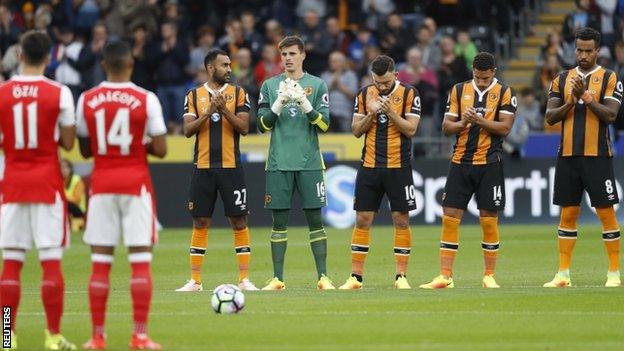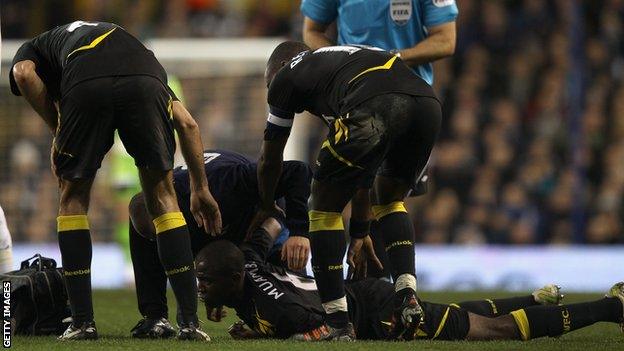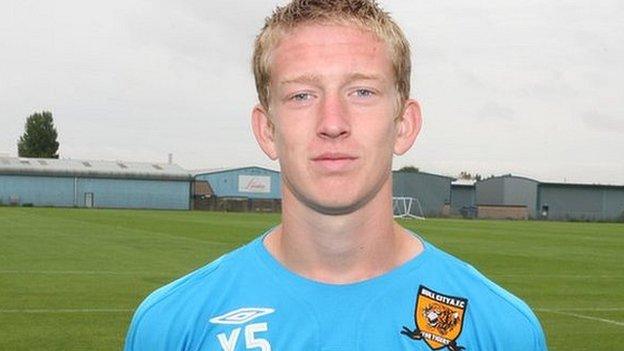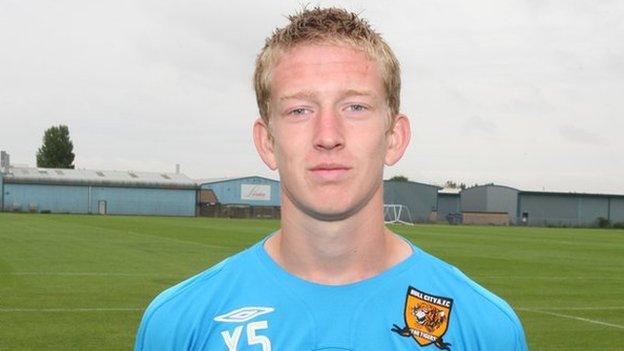Daniel Wilkinson death: 'Too many are being lost to cardiac issues' - experts
- Published

Daniel Wilkinson's former club Hull City held a minute's applause in his memory
All young people involved in sport should be screened for underlying heart conditions, experts say.
It comes three weeks after 24-year-old non-league footballer Daniel Wilkinson died during a game.
An appeal has been set up in memory of the player to fund heart checks, external in grassroots football.
"Too many people are being lost where we could intervene," said MP Mims Davies, who is calling for widespread cardiac screening for young people.
"The majority of young sudden cardiac deaths occur at grassroots or in the community," added Dr Steven Cox, chief executive of the charity Cardiac Risk in the Young (CRY), which runs screening programmes.
The Football Association carries out 1,400 screenings each year - but only at professional clubs.
Former Hull City youngster Wilkinson collapsed while playing for Shaw Lane during a Northern Premier League Division One South game at Brighouse Town.
It was later found he had Arrhythmogenic Right Ventricular Cardiomyopathy (ARVC) - the same condition that forced former Bolton midfielder Fabrice Muamba to retire in 2012.
England Under-21 international Muamba was, according to Bolton's club doctor, "in effect dead" for 78 minutes after collapsing during a match against Tottenham.
MP Davies has raised the issue of health screenings in Parliament, and both she and Dr Cox champion screening for all young people after a similar project in Italy saw an 89% drop in cardiac-related fatalities.
And while Dr Cox accepted the FA and other governing bodies had "established" screening processes at the highest level, he said "more could be done" for recreational athletes.
"Some clubs or schools work with CRY, but this is usually after a tragedy that raises awareness of the threat," he said.
"If governing bodies could routinely send out a positive message about the importance of cardiac screening it would have a massive impact and save many young lives."
Is there a need for it?

Fabrice Muamba collapsed on the White Hart Lane pitch in 2012
According to CRY's statistics, 12 people under the age of 35 die from an undiagnosed cardiac condition every week in the UK.
However, CRY believes the figure could be higher, as it is difficult to diagnose cardiac issues after the heart has stopped beating.
There have been a number of high-profile cardiac deaths and incidents across the top level of a number of sports in recent times.
Muamba's collapse happened during an FA Cup sixth-round tie that was being shown live on television.
England batsman James Taylor, 26, retired from cricket earlier this year after he fell ill and tests revealed a similar condition to Muamba's.
Wales rugby league player Danny Jones, 29, died after a cardiac arrest, triggered by hereditary heart disease, during a game in 2015.
However, the UK's National Screening Committee - the body that advises ministers and the NHS on screening - last year upheld its decision to recommend against a national screening programme for sudden cardiac death of people between 12 and 39.
It says the available tests are not accurate enough to correctly identify conditions which could lead to sudden cardiac death without wrongly identifying many people with healthy hearts.
"Someone who is identified as having a high risk of sudden cardiac death may become anxious about their physical activity and stop regularly exercising which can be detrimental to their overall health," a spokesman said. "This is an important consideration whilst also acknowledging that screening would not pick-up all young people with a heart problem and give them false reassurance," they added.
Screening 'even more appropriate' at grassroots
Dean Holdsworth, founder of the Non-League Footballers' Association, believes the grassroots level of the sport requires special attention to warn players of the dangers of cardiac issues.
"It takes a tragedy to make people realise that it's needed, which is a real shame," the former Wimbledon and Bolton Wanderers striker told BBC Sport.
"A part-time player may only train once a week and then thrash around for 90 minutes on a Saturday or a Sunday, putting in levels of wear and tear that their bodies aren't used to.
"Players need to take more responsibility for their own screening, but if clubs can push to qualify with the FA for this screening they have to take advantage of it.
"It's really important that players, clubs, county FAs and every person responsible for training a player at whatever level, look at this and say 'please make sure you're screened'."
What is a cardiac screening?
The FA cardiac screening programme is the longest and most extensive in British sport
The FA carries out approximately 1,400 screenings each season across England and Wales for all professional clubs and national call-ups
Players who sign as a scholar, usually aged 16, have a cardiac screening
First they answer a health questionnaire before having an electrocardiogram (ECG), which measures the electrical rhythm of the heart and is checked for irregularities by a doctor
This is followed by an echocardiogram, which is similar to a pregnancy ultrasound scan, and measures the dimensions of the heart, and the volume of blood flow in and out of it
Further screening is recommended by the FA with an ECG at the age of 18, then again at 20 to detect any age-related conditions that may manifest during later teenage years
CRY recommends health checks from the age of 14 - by which time the heart is fully developed and problems likely to show up
It is a club's responsibility to follow this up - each club has its own policy regarding new signings but the FA recommends everyone should be screened at least once
A cardiac screening with CRY costs about £35
The Italian programme
In 1982, Italy introduced mandatory screening for all young athletes taking part in organised sport.
A 25-year study of the programme showed an 89% drop in sudden cardiac deaths in athletes, from 3.6 per 100,000 to 0.4 per 100,000.
The model was highlighted by sports minister Tracey Crouch after the death of another non-league footballer, Junior Dian of Tonbridge Angels, in July 2015.
"It's an important area and one that I'll be looking at in some detail in the forthcoming sports strategy," she said at the time.
The government is looking into whether the Italian model could be followed.
"In Italy they've had a huge reduction in deaths by having an organised routine. I think there is a real opportunity to make an intervention that is going to change people's lives," Davies said.
"I think that now there is an understanding and a sense of urgency and the fact that the government is looking at it again is a good step forward."
Daniel Wilkinson's legacy?
Shaw Lane club chairman Craig Wood has set up a crowdfunding page to raise £50,000 to help increase screening in grassroots football.
"The Daniel Wilkinson Foundation has been set up to raise funds that will ultimately safe lives," Wood said.
"By donating to this foundation and with the support of the FA and county FAs, every penny raised will go towards providing screenings for all footballers at grassroots levels and to assist clubs in purchasing defibrillators and to provide training in CPR.
"We must ensure that Daniel's death is not in vain and that no more young footballers lose their lives."
- Published16 September 2016

- Attribution
- Published14 September 2016

- Published13 September 2016

- Published14 January 2018
- Published8 August 2017

- Published7 June 2019
